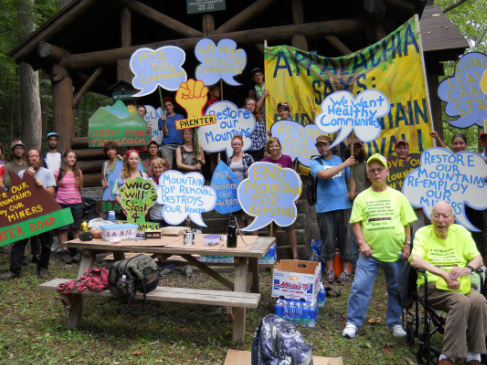
While there was some good, respectful dialogue between miners and their families on one side and MTR opponents on the other at a nearby park, there were also a lot of threats and intimidation. Twenty-five activists who were not arrested had to walk a gauntlet of angry locals for more than five miles, which one participant described as the most hostility he’d experienced in 40 years of activism.
That evening, the organizers were in Charleston (about 90 minutes from the action, and 90 minutes from training camp in another direction), trying to track down all of those arrested and deal with a barrage of media calls. When some folks tried to head back to camp late at night, they were advised not to by the camp’s owner, James Tawney, who runs a sheep farm and is outspoken in his own views against MTR, because angry neighbors had felled trees to block the road and shot off guns near the property. James is well-armed himself and apparently not afraid to defend his family and his land.
Folks were able to return Sunday morning (the trees had been moved) and joined others for a debriefing. Some talked about being traumatized by the violence of MTR itself – where mountain ridges are dynamited to get at the coal seams beneath, with tons of rocks and soil flying up and being dumped in valleys, often burying streams – and by the damage it’s doing to local communities. Others had been affected by the tension and fear of personally confronting angry workers who fear the loss of their livelihood if MTR sites are closed down.
Toward evening a group of angry neighbors/miners breached the property line and things were tense. Some folks wanted to invite them for dinner (home-made pizza was almost ready), but others nixed that, saying the intruders had also been drinking and things could get ugly. Some of the RAMPS leaders spoke to the men, and after a half-hour or so they moved away (but nobody knew how far away). James called the cops, and two patrol cars escorted those of us wanting to leave down the long, winding dirt road to the county road. (Turns out one of the trees cut down was on one of the officer’s property, and was he pissed.)
I was in that mini-caravan, headed to a motel in the nearest town, Summersville, about 16 miles away, where I could get phone service and get on the internet to file my first story, and take a shower – none of which had been available at the camp which had been my home base for five days as I interviewed activists and walked in the beautiful, diverse, green forest – no drought here, in fact the opposite, as raging thunderstorms had swept through several times in the past month.
 RSS Feed
RSS Feed
